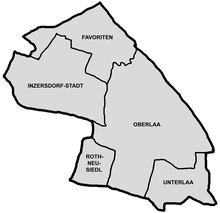Favoriten
| Favoriten | ||
|---|---|---|
| 10th District of Vienna | ||
|
||
 Location of the district within Vienna |
||
| Country | Austria | |
| City | Vienna | |
| Government | ||
| • District Director | Hermine Mospointner (SPÖ) | |
| • First Deputy | Josef Kaindl (SPÖ) | |
| • Second Deputy | Michael Mrkvicka (FPÖ) | |
| • Representation (60 Members) |
SPÖ 25, FPÖ 24, ÖVP 4, Greens 4, NEOS 2, GFW 1 |
|
| Area | ||
| • Total | 31.8 km2 (12.3 sq mi) | |
| Population (2016-01-01) | ||
| • Total | 194,820 | |
| • Density | 6,100/km2 (16,000/sq mi) | |
| Postal code | A-1100 | |
| Address of District Office |
Keplerplatz 5 A-1100 Wien (image below) |
|
| Website | www.wien.gv.at/bezirke/favoriten/ | |
Favoriten (German pronunciation: [fafoˈʀiːtən]), the 10th district of Vienna, Austria (German: 10. Bezirk, Favoriten), is located south of the central districts. It is south of Innere Stadt, Wieden and Margareten. Favoriten is a heavily populated urban area with many residential buildings, but also large recreational areas and parks.
The name comes from Favorita, a semi-baroque palace complex that once served as a hunting castle but today is the Theresianum a gymnasium (secondary school) in the 4th district (Wieden). The customs facilities at the original southern border of Vienna were known as the Favoriten-Linie (Favoriten Line) while nearby houses were known as the Siedlung vor der Favoriten-Linie (Settlement in front of the Favoriten Line).
The Favoriten District includes 6 sections: Katastralgemeinden Favoriten, Inzersdorf-Stadt, Rothneusiedl, Unterlaa, Oberlaa-Stadt and Oberlaa-Land, as well as small parts of the 2 sections Katastralgemeinden Kaiserebersdorf and Simmering.
The northern part of the district is the historical Favoriten (Workers District), a grid-patterned residential area with many houses over 100 years old, plus intermediate industries (such as the complex of Ankerbrot AG). On the western edge of the district are two contrasting developments, opposite each other: during the inter-war period, George Washington Court was built (as a stylish Gemeindebau); and during 1990-2000, Business Park Vienna was built, including Vienna Twin Towers (skyscrapers), bounded on the south, by the forty-years-older Philipshaus on Trieste Street, in the architecture of classical Modernism.
...
Wikipedia


